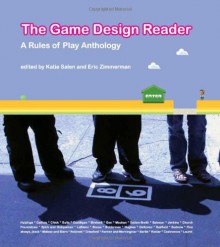
Published in 2004, Richard A. Bartle's Designing Virtual Worlds, is a great resource for the modern software designer. The lessons learned from the early days of Multi-User Dungeons (MUDs) can be directly applied to help make any Internet or mobile application more fun and successful. Gamification is an important tool in today's world of social networks and smart phones. With Bartle's book you're getting advice from one of the main inventors of addictive software.
Bartle was one of the co-creators of MUD1, a pioneering text adventure game that enable people across the early Internet (the Internet of dialup modems) to play in a collaborative fashion. His book, Designing Virtual Worlds (DVW), contains everything a product designer needs to know about where virtual worlds came from, their core elements, how they are produced, who plays them, their problems and pitfalls, and where they are going. When you take into consideration how greatly technology has changed between 2004 and 2013, the fact that DVW is still relevant is an amazing accomplishment.
There are two reasons for DVW's success as a book...
It doesn't contain code. Software tools age rapidly. Almost none of the operating systems and platforms consumers use today existed in 2004. Bartle explains core concepts which can be applied in any technical paradigm. The savvy young coder writing a modern virtual world or social application in Node.js and MongoDB will get plenty of value out of DVW without having to wade through C++ code.
The other reason is more profound: Human beings are natural gamers. One of our main distinguishing characteristics is that we play well after childhood. Bartle is a an astute observer of human behavior and MUD1 was designed with humans in mind. Bartle's chapters on translating motivation, narrative, and psychology into the design of a virtual world are priceless.
If you think about it, we live in several "virtual worlds" simultaneously. Facebook and Twitter are virtual worlds. Tumblr and even the Huffington Post are virtual worlds. They each have their own physics, characters, events, shared resources, and persistence. That's because they are all gamified in someway. If you want to design a product that is as successful as any of those you should read Bartle.
 This is an excellent resource for anyone interested in thinking about play and games. There is a very broad selection of essays and articles that touch upon historical and cultural issues of play, as well as specific games ranging from folk games to board games, card games, and of course video games.
This is an excellent resource for anyone interested in thinking about play and games. There is a very broad selection of essays and articles that touch upon historical and cultural issues of play, as well as specific games ranging from folk games to board games, card games, and of course video games. This is a good book. I took my time with it, but really enjoyed it. It's very high level as other reviews suggests, so if you want on overview of game design, this is a great book. There are some practical bits about building games too, but mostly it's about what designers do and how to be a good designer. The "lens" meme that runs throughout the book is fantastic.
This is a good book. I took my time with it, but really enjoyed it. It's very high level as other reviews suggests, so if you want on overview of game design, this is a great book. There are some practical bits about building games too, but mostly it's about what designers do and how to be a good designer. The "lens" meme that runs throughout the book is fantastic.
 A collection of essays by some of the outstanding game designers of our time. The range of topics varies quite a bit, and a few of the essays were not that great.
A collection of essays by some of the outstanding game designers of our time. The range of topics varies quite a bit, and a few of the essays were not that great.